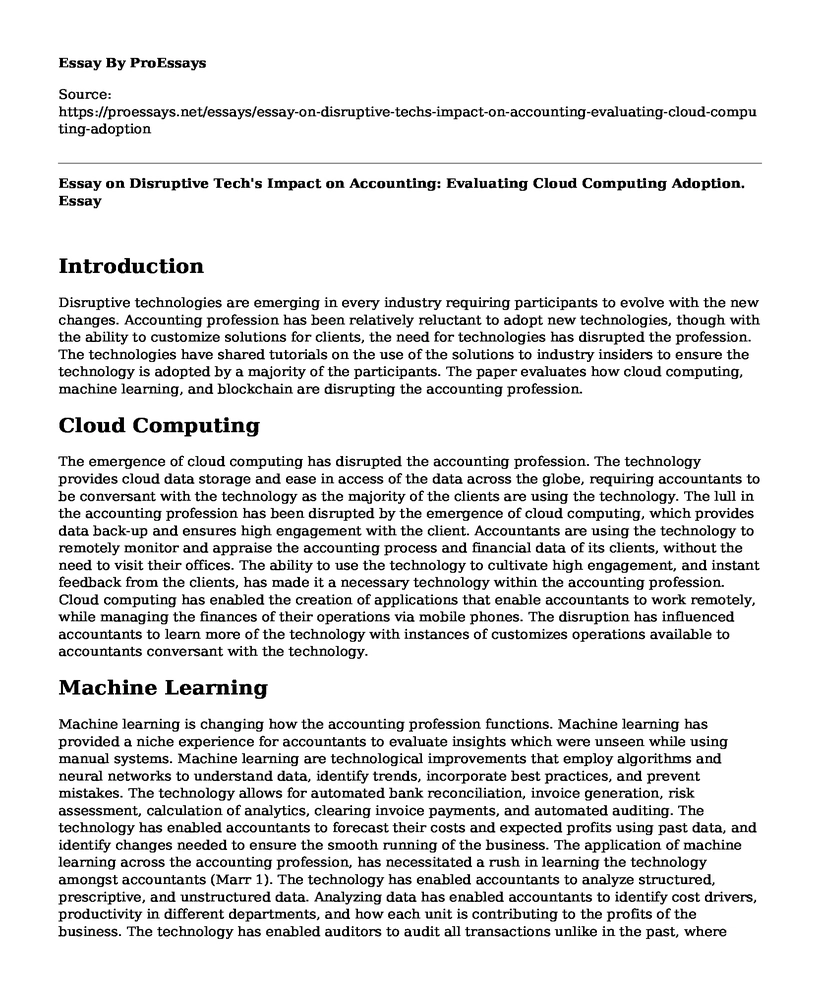Introduction
Disruptive technologies are emerging in every industry requiring participants to evolve with the new changes. Accounting profession has been relatively reluctant to adopt new technologies, though with the ability to customize solutions for clients, the need for technologies has disrupted the profession. The technologies have shared tutorials on the use of the solutions to industry insiders to ensure the technology is adopted by a majority of the participants. The paper evaluates how cloud computing, machine learning, and blockchain are disrupting the accounting profession.
Cloud Computing
The emergence of cloud computing has disrupted the accounting profession. The technology provides cloud data storage and ease in access of the data across the globe, requiring accountants to be conversant with the technology as the majority of the clients are using the technology. The lull in the accounting profession has been disrupted by the emergence of cloud computing, which provides data back-up and ensures high engagement with the client. Accountants are using the technology to remotely monitor and appraise the accounting process and financial data of its clients, without the need to visit their offices. The ability to use the technology to cultivate high engagement, and instant feedback from the clients, has made it a necessary technology within the accounting profession. Cloud computing has enabled the creation of applications that enable accountants to work remotely, while managing the finances of their operations via mobile phones. The disruption has influenced accountants to learn more of the technology with instances of customizes operations available to accountants conversant with the technology.
Machine Learning
Machine learning is changing how the accounting profession functions. Machine learning has provided a niche experience for accountants to evaluate insights which were unseen while using manual systems. Machine learning are technological improvements that employ algorithms and neural networks to understand data, identify trends, incorporate best practices, and prevent mistakes. The technology allows for automated bank reconciliation, invoice generation, risk assessment, calculation of analytics, clearing invoice payments, and automated auditing. The technology has enabled accountants to forecast their costs and expected profits using past data, and identify changes needed to ensure the smooth running of the business. The application of machine learning across the accounting profession, has necessitated a rush in learning the technology amongst accountants (Marr 1). The technology has enabled accountants to analyze structured, prescriptive, and unstructured data. Analyzing data has enabled accountants to identify cost drivers, productivity in different departments, and how each unit is contributing to the profits of the business. The technology has enabled auditors to audit all transactions unlike in the past, where auditors audited sectional accounts to identify gaps in an accounting period. machine learning trends indicate that the technology will further disrupt the accounting profession by creation of insights such as spin-offs, new skills, and independent systems, requiring accountants to be adept with the technology.
Blockchain
Blockchain technology continues to change the accounting profession, with its impact primarily being felt in the accounting profession. The technology uses distributed ledger technology to record accounting records, form blocks which are stored and retrieved by users of the data in their original context. The technology allows for accountants to ensure accurate recordkeeping, enhanced efficiency, prevention of errors, automated reconciliation, lower costs, prevention of fraud, compliance with regulatory requirements, and auditing enhancement. The use of blockchain in transactions, especially cryptocurrencies has opened a new window for evaluation of accounting transactions. The application of blockchain technology has enabled investors, and other users to evaluate company data before investment, providing accurate and real-time data.
Conclusion
Conclusively, the technologies continue to disrupt the accounting profession, with further innovations expected to change how the accounting profession works. Machine learning, cloud computing, and blockchain will continue to change the scope of the accounting process over time.
Works Cited
Marr, Bernard. "Machine Learning, Artificial Intelligence - And The Future Of Accounting". Forbes.Com, 2017, https://www.forbes.com/sites/bernardmarr/2017/07/07/machine-learning-artificial-intelligence-and-the-future-of-accounting/#24443c9e2dd1. Accessed 2 May 2019.
Cite this page
Essay on Disruptive Tech's Impact on Accounting: Evaluating Cloud Computing Adoption.. (2023, Jan 10). Retrieved from https://proessays.net/essays/essay-on-disruptive-techs-impact-on-accounting-evaluating-cloud-computing-adoption
If you are the original author of this essay and no longer wish to have it published on the ProEssays website, please click below to request its removal:
- IFRS and GAAP
- Annotated Bibliography: Does Technology Benefit Students?
- Professional Roles of an Audit Senior Versus a Staff Accountant - Essay Sample
- Safety Management Systems in Toshiba Organization - Essay Sample
- Essay Sample: Is Google Making Us Digital Slaves?
- Essay Example on Analyzing Data: Summary Function Is Vital
- Essay Example on Cybersecurity: Protecting Info Tech Infra from Cyber Risk







